荷塘月色 三个译文
- 格式:doc
- 大小:47.00 KB
- 文档页数:5

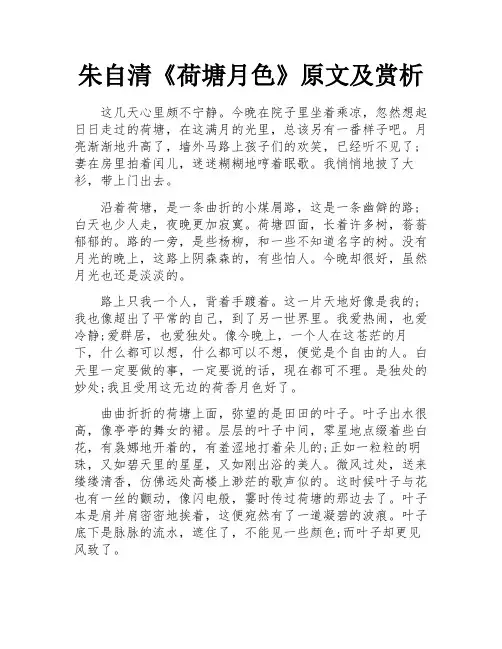
朱自清《荷塘月色》原文及赏析这几天心里颇不宁静。
今晚在院子里坐着乘凉,忽然想起日日走过的荷塘,在这满月的光里,总该另有一番样子吧。
月亮渐渐地升高了,墙外马路上孩子们的欢笑,已经听不见了;妻在房里拍着闰儿,迷迷糊糊地哼着眠歌。
我悄悄地披了大衫,带上门出去。
沿着荷塘,是一条曲折的小煤屑路,这是一条幽僻的路;白天也少人走,夜晚更加寂寞。
荷塘四面,长着许多树,蓊蓊郁郁的。
路的一旁,是些杨柳,和一些不知道名字的树。
没有月光的晚上,这路上阴森森的,有些怕人。
今晚却很好,虽然月光也还是淡淡的。
路上只我一个人,背着手踱着。
这一片天地好像是我的;我也像超出了平常的自己,到了另一世界里。
我爱热闹,也爱冷静;爱群居,也爱独处。
像今晚上,一个人在这苍茫的月下,什么都可以想,什么都可以不想,便觉是个自由的人。
白天里一定要做的事,一定要说的话,现在都可不理。
是独处的妙处;我且受用这无边的荷香月色好了。
曲曲折折的荷塘上面,弥望的是田田的叶子。
叶子出水很高,像亭亭的舞女的裙。
层层的叶子中间,零星地点缀着些白花,有袅娜地开着的,有羞涩地打着朵儿的;正如一粒粒的明珠,又如碧天里的星星,又如刚出浴的美人。
微风过处,送来缕缕清香,仿佛远处高楼上渺茫的歌声似的。
这时候叶子与花也有一丝的颤动,像闪电般,霎时传过荷塘的那边去了。
叶子本是肩并肩密密地挨着,这便宛然有了一道凝碧的波痕。
叶子底下是脉脉的流水,遮住了,不能见一些颜色;而叶子却更见风致了。
月光如流水一般,静静地泻在这一片叶子和花上。
薄薄的青雾浮起在荷塘里。
叶子和花仿佛在牛乳中洗过一样;又像笼着轻纱的梦。
虽然是满月,天上却有一层淡淡的云,所以不能朗照;但我以为这恰是到了好处——酣眠固不可少,小睡也别有风味的。
月光是隔了树照过来的,高处丛生的灌木,落下参差的斑驳的黑影,峭楞楞如鬼一般;弯弯的杨柳的稀疏的倩影,却又像是画在荷叶上。
塘中的月色并不均匀;但光与影有着和谐的旋律,如梵婀玲上奏着的名曲。

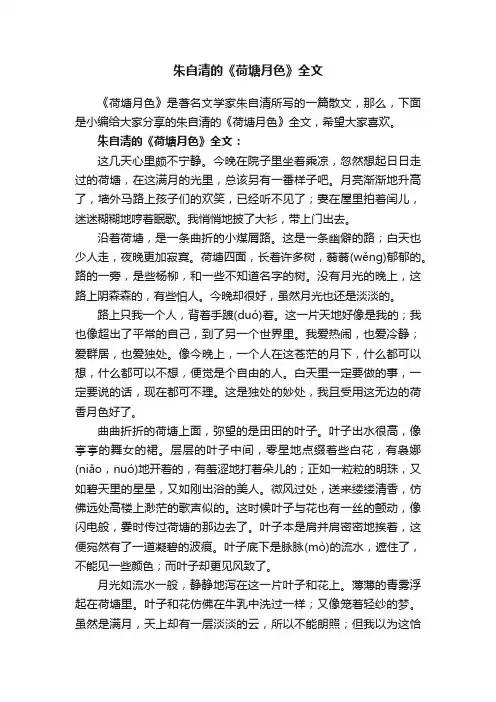
朱自清的《荷塘月色》全文《荷塘月色》是著名文学家朱自清所写的一篇散文,那么,下面是小编给大家分享的朱自清的《荷塘月色》全文,希望大家喜欢。
朱自清的《荷塘月色》全文:这几天心里颇不宁静。
今晚在院子里坐着乘凉,忽然想起日日走过的荷塘,在这满月的光里,总该另有一番样子吧。
月亮渐渐地升高了,墙外马路上孩子们的欢笑,已经听不见了;妻在屋里拍着闰儿,迷迷糊糊地哼着眠歌。
我悄悄地披了大衫,带上门出去。
沿着荷塘,是一条曲折的小煤屑路。
这是一条幽僻的路;白天也少人走,夜晚更加寂寞。
荷塘四面,长着许多树,蓊蓊(wěng)郁郁的。
路的一旁,是些杨柳,和一些不知道名字的树。
没有月光的晚上,这路上阴森森的,有些怕人。
今晚却很好,虽然月光也还是淡淡的。
路上只我一个人,背着手踱(duó)着。
这一片天地好像是我的;我也像超出了平常的自己,到了另一个世界里。
我爱热闹,也爱冷静;爱群居,也爱独处。
像今晚上,一个人在这苍茫的月下,什么都可以想,什么都可以不想,便觉是个自由的人。
白天里一定要做的事,一定要说的话,现在都可不理。
这是独处的妙处,我且受用这无边的荷香月色好了。
曲曲折折的荷塘上面,弥望的是田田的叶子。
叶子出水很高,像亭亭的舞女的裙。
层层的叶子中间,零星地点缀着些白花,有袅娜(niǎo,nuó)地开着的,有羞涩地打着朵儿的;正如一粒粒的明珠,又如碧天里的星星,又如刚出浴的美人。
微风过处,送来缕缕清香,仿佛远处高楼上渺茫的歌声似的。
这时候叶子与花也有一丝的颤动,像闪电般,霎时传过荷塘的那边去了。
叶子本是肩并肩密密地挨着,这便宛然有了一道凝碧的波痕。
叶子底下是脉脉(mò)的流水,遮住了,不能见一些颜色;而叶子却更见风致了。
月光如流水一般,静静地泻在这一片叶子和花上。
薄薄的青雾浮起在荷塘里。
叶子和花仿佛在牛乳中洗过一样;又像笼着轻纱的梦。
虽然是满月,天上却有一层淡淡的云,所以不能朗照;但我以为这恰是到了好处——酣眠固不可少,小睡也别有风味的。
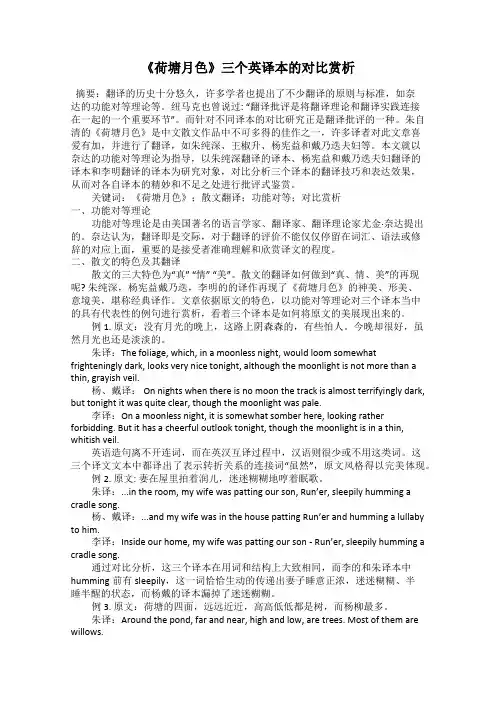
《荷塘月色》三个英译本的对比赏析摘要:翻译的历史十分悠久,许多学者也提出了不少翻译的原则与标准,如奈达的功能对等理论等。
纽马克也曾说过: “翻译批评是将翻译理论和翻译实践连接在一起的一个重要环节”。
而针对不同译本的对比研究正是翻译批评的一种。
朱自清的《荷塘月色》是中文散文作品中不可多得的佳作之一,许多译者对此文章喜爱有加,并进行了翻译,如朱纯深、王椒升、杨宪益和戴乃迭夫妇等。
本文就以奈达的功能对等理论为指导,以朱纯深翻译的译本、杨宪益和戴乃迭夫妇翻译的译本和李明翻译的译本为研究对象,对比分析三个译本的翻译技巧和表达效果,从而对各自译本的精妙和不足之处进行批评式鉴赏。
关键词:《荷塘月色》;散文翻译;功能对等;对比赏析一、功能对等理论功能对等理论是由美国著名的语言学家、翻译家、翻译理论家尤金·奈达提出的。
奈达认为,翻译即是交际,对于翻译的评价不能仅仅停留在词汇、语法或修辞的对应上面,重要的是接受者准确理解和欣赏译文的程度。
二、散文的特色及其翻译散文的三大特色为“真” “情” “美”。
散文的翻译如何做到“真、情、美”的再现呢? 朱纯深,杨宪益戴乃迭,李明的的译作再现了《荷塘月色》的神美、形美、意境美,堪称经典译作。
文章依据原文的特色,以功能对等理论对三个译本当中的具有代表性的例句进行赏析,看着三个译本是如何将原文的美展现出来的。
例1. 原文:没有月光的晚上,这路上阴森森的,有些怕人。
今晚却很好,虽然月光也还是淡淡的。
朱译:The foliage, which, in a moonless night, would loom somewhat frighteningly dark, looks very nice tonight, although the moonlight is not more than a thin, grayish veil.杨、戴译: On nights when there is no moon the track is almost terrifyingly dark, but tonight it was quite clear, though the moonlight was pale.李译:On a moonless night, it is somewhat somber here, looking rather forbidding. But it has a cheerful outlook tonight, though the moonlight is in a thin, whitish veil.英语造句离不开连词,而在英汉互译过程中,汉语则很少或不用这类词。
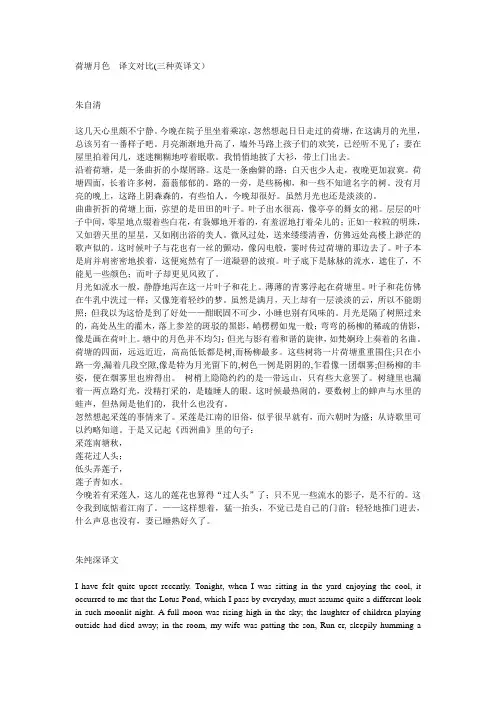
荷塘月色---译文对比(三种英译文)朱自清这几天心里颇不宁静。
今晚在院子里坐着乘凉,忽然想起日日走过的荷塘,在这满月的光里,总该另有一番样子吧。
月亮渐渐地升高了,墙外马路上孩子们的欢笑,已经听不见了;妻在屋里拍着闰儿,迷迷糊糊地哼着眠歌。
我悄悄地披了大衫,带上门出去。
沿着荷塘,是一条曲折的小煤屑路。
这是一条幽僻的路;白天也少人走,夜晚更加寂寞。
荷塘四面,长着许多树,蓊蓊郁郁的。
路的一旁,是些杨柳,和一些不知道名字的树。
没有月亮的晚上,这路上阴森森的,有些怕人。
今晚却很好。
虽然月光也还是淡淡的。
曲曲折折的荷塘上面,弥望的是田田的叶子。
叶子出水很高,像亭亭的舞女的裙。
层层的叶子中间,零星地点缀着些白花,有袅娜地开着的,有羞涩地打着朵儿的;正如一粒粒的明珠,又如碧天里的星星,又如刚出浴的美人。
微风过处,送来缕缕清香,仿佛远处高楼上渺茫的歌声似的。
这时候叶子与花也有一丝的颤动,像闪电般,霎时传过荷塘的那边去了。
叶子本是肩并肩密密地挨着,这便宛然有了一道凝碧的波痕。
叶子底下是脉脉的流水,遮住了,不能见一些颜色;而叶子却更见风致了。
月光如流水一般,静静地泻在这一片叶子和花上。
薄薄的青雾浮起在荷塘里。
叶子和花仿佛在牛乳中洗过一样;又像笼着轻纱的梦。
虽然是满月,天上却有一层淡淡的云,所以不能朗照;但我以为这恰是到了好处——酣眠固不可少,小睡也别有风味的。
月光是隔了树照过来的,高处丛生的灌木,落上参差的斑驳的黑影,峭楞楞如鬼一般;弯弯的杨柳的稀疏的倩影,像是画在荷叶上。
塘中的月色并不均匀;但光与影有着和谐的旋律,如梵婀玲上奏着的名曲。
荷塘的四面,远远近近,高高低低都是树,而杨柳最多。
这些树将一片荷塘重重围住;只在小路一旁,漏着几段空隙,像是特为月光留下的,树色一例是阴阴的,乍看像一团烟雾;但杨柳的丰姿,便在烟雾里也辨得出。
树梢上隐隐约约的是一带远山,只有些大意罢了。
树缝里也漏着一两点路灯光,没精打采的,是瞌睡人的眼。
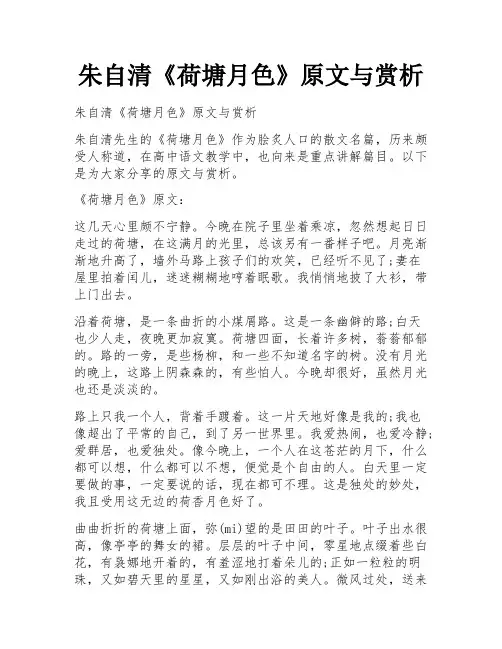
朱自清《荷塘月色》原文与赏析朱自清《荷塘月色》原文与赏析朱自清先生的《荷塘月色》作为脍炙人口的散文名篇,历来颇受人称道,在高中语文教学中,也向来是重点讲解篇目。
以下是为大家分享的原文与赏析。
《荷塘月色》原文:这几天心里颇不宁静。
今晚在院子里坐着乘凉,忽然想起日日走过的荷塘,在这满月的光里,总该另有一番样子吧。
月亮渐渐地升高了,墙外马路上孩子们的欢笑,已经听不见了;妻在屋里拍着闰儿,迷迷糊糊地哼着眠歌。
我悄悄地披了大衫,带上门出去。
沿着荷塘,是一条曲折的小煤屑路。
这是一条幽僻的路;白天也少人走,夜晚更加寂寞。
荷塘四面,长着许多树,蓊蓊郁郁的。
路的一旁,是些杨柳,和一些不知道名字的树。
没有月光的晚上,这路上阴森森的,有些怕人。
今晚却很好,虽然月光也还是淡淡的。
路上只我一个人,背着手踱着。
这一片天地好像是我的;我也像超出了平常的自己,到了另一世界里。
我爱热闹,也爱冷静;爱群居,也爱独处。
像今晚上,一个人在这苍茫的月下,什么都可以想,什么都可以不想,便觉是个自由的人。
白天里一定要做的事,一定要说的话,现在都可不理。
这是独处的妙处,我且受用这无边的荷香月色好了。
曲曲折折的荷塘上面,弥(mi)望的是田田的叶子。
叶子出水很高,像亭亭的舞女的裙。
层层的叶子中间,零星地点缀着些白花,有袅娜地开着的,有羞涩地打着朵儿的;正如一粒粒的明珠,又如碧天里的星星,又如刚出浴的美人。
微风过处,送来缕缕清香,仿佛远处高楼上渺茫的歌声似的。
这时候叶子与花也有一丝的颤动,像闪电般,霎时传过荷塘的那边去了。
叶子本是肩并肩密密地挨着,这便宛然有了一道凝碧的波痕。
叶子底下是脉脉的流水,遮住了,不能见一些颜色;而叶子却更见风致了。
月光如流水一般,静静地泻在这一片叶子和花上。
薄薄的青雾浮起在荷塘里。
叶子和花仿佛在牛***中洗过一样;又像笼着轻纱的梦。
虽然是满月,天上却有一层淡淡的云,所以不能朗照;但我以为这恰是到了好处——酣(han)眠固不可少,小睡也别有风味的。
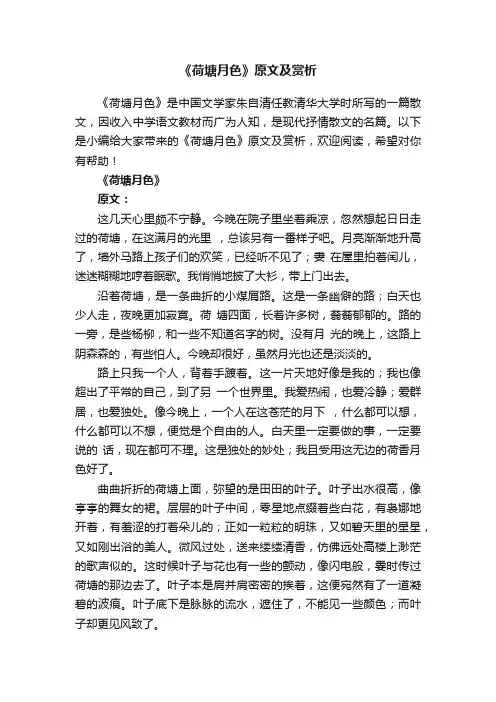
《荷塘月色》原文及赏析《荷塘月色》是中国文学家朱自清任教清华大学时所写的一篇散文,因收入中学语文教材而广为人知,是现代抒情散文的名篇。
以下是小编给大家带来的《荷塘月色》原文及赏析,欢迎阅读,希望对你有帮助!《荷塘月色》原文:这几天心里颇不宁静。
今晚在院子里坐着乘凉,忽然想起日日走过的荷塘,在这满月的光里,总该另有一番样子吧。
月亮渐渐地升高了,墙外马路上孩子们的欢笑,已经听不见了;妻在屋里拍着闰儿,迷迷糊糊地哼着眠歌。
我悄悄地披了大衫,带上门出去。
沿着荷塘,是一条曲折的小煤屑路。
这是一条幽僻的路;白天也少人走,夜晚更加寂寞。
荷塘四面,长着许多树,蓊蓊郁郁的。
路的一旁,是些杨柳,和一些不知道名字的树。
没有月光的晚上,这路上阴森森的,有些怕人。
今晚却很好,虽然月光也还是淡淡的。
路上只我一个人,背着手踱着。
这一片天地好像是我的;我也像超出了平常的自己,到了另一个世界里。
我爱热闹,也爱冷静;爱群居,也爱独处。
像今晚上,一个人在这苍茫的月下,什么都可以想,什么都可以不想,便觉是个自由的人。
白天里一定要做的事,一定要说的话,现在都可不理。
这是独处的妙处;我且受用这无边的荷香月色好了。
曲曲折折的荷塘上面,弥望的是田田的叶子。
叶子出水很高,像亭亭的舞女的裙。
层层的叶子中间,零星地点缀着些白花,有袅娜地开着,有羞涩的打着朵儿的;正如一粒粒的明珠,又如碧天里的星星,又如刚出浴的美人。
微风过处,送来缕缕清香,仿佛远处高楼上渺茫的歌声似的。
这时候叶子与花也有一些的颤动,像闪电般,霎时传过荷塘的那边去了。
叶子本是肩并肩密密的挨着,这便宛然有了一道凝碧的波痕。
叶子底下是脉脉的流水,遮住了,不能见一些颜色;而叶子却更见风致了。
月光如流水一般,静静地泻在这一片叶子和花上。
薄薄的青雾浮起在荷塘里。
叶子和花仿佛在牛乳中洗过一样;又像笼着轻纱的梦。
虽然是满月,天上却有一层淡淡的云,所以不能朗照;但我以为这恰是到了好处--酣眠固不可少,小睡也别有风味的。
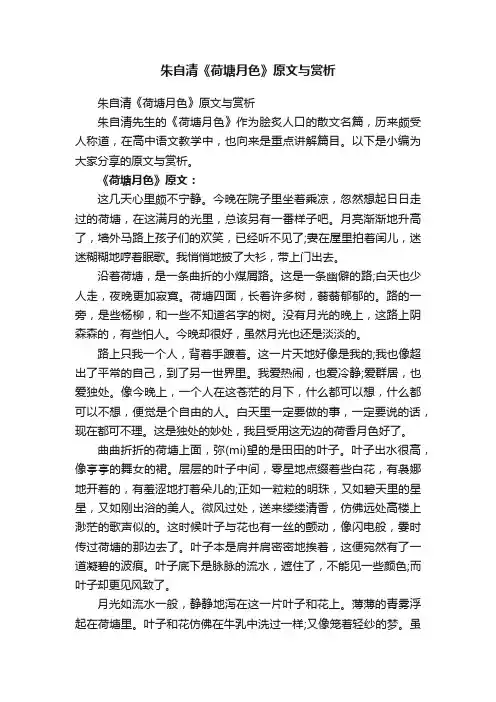
朱自清《荷塘月色》原文与赏析朱自清《荷塘月色》原文与赏析朱自清先生的《荷塘月色》作为脍炙人口的散文名篇,历来颇受人称道,在高中语文教学中,也向来是重点讲解篇目。
以下是小编为大家分享的原文与赏析。
《荷塘月色》原文:这几天心里颇不宁静。
今晚在院子里坐着乘凉,忽然想起日日走过的荷塘,在这满月的光里,总该另有一番样子吧。
月亮渐渐地升高了,墙外马路上孩子们的欢笑,已经听不见了;妻在屋里拍着闰儿,迷迷糊糊地哼着眠歌。
我悄悄地披了大衫,带上门出去。
沿着荷塘,是一条曲折的小煤屑路。
这是一条幽僻的路;白天也少人走,夜晚更加寂寞。
荷塘四面,长着许多树,蓊蓊郁郁的。
路的一旁,是些杨柳,和一些不知道名字的树。
没有月光的晚上,这路上阴森森的,有些怕人。
今晚却很好,虽然月光也还是淡淡的。
路上只我一个人,背着手踱着。
这一片天地好像是我的;我也像超出了平常的自己,到了另一世界里。
我爱热闹,也爱冷静;爱群居,也爱独处。
像今晚上,一个人在这苍茫的月下,什么都可以想,什么都可以不想,便觉是个自由的人。
白天里一定要做的事,一定要说的话,现在都可不理。
这是独处的妙处,我且受用这无边的荷香月色好了。
曲曲折折的荷塘上面,弥(mi)望的是田田的叶子。
叶子出水很高,像亭亭的舞女的裙。
层层的叶子中间,零星地点缀着些白花,有袅娜地开着的,有羞涩地打着朵儿的;正如一粒粒的明珠,又如碧天里的星星,又如刚出浴的美人。
微风过处,送来缕缕清香,仿佛远处高楼上渺茫的歌声似的。
这时候叶子与花也有一丝的颤动,像闪电般,霎时传过荷塘的那边去了。
叶子本是肩并肩密密地挨着,这便宛然有了一道凝碧的波痕。
叶子底下是脉脉的流水,遮住了,不能见一些颜色;而叶子却更见风致了。
月光如流水一般,静静地泻在这一片叶子和花上。
薄薄的青雾浮起在荷塘里。
叶子和花仿佛在牛乳中洗过一样;又像笼着轻纱的梦。
虽然是满月,天上却有一层淡淡的云,所以不能朗照;但我以为这恰是到了好处——酣(han)眠固不可少,小睡也别有风味的。
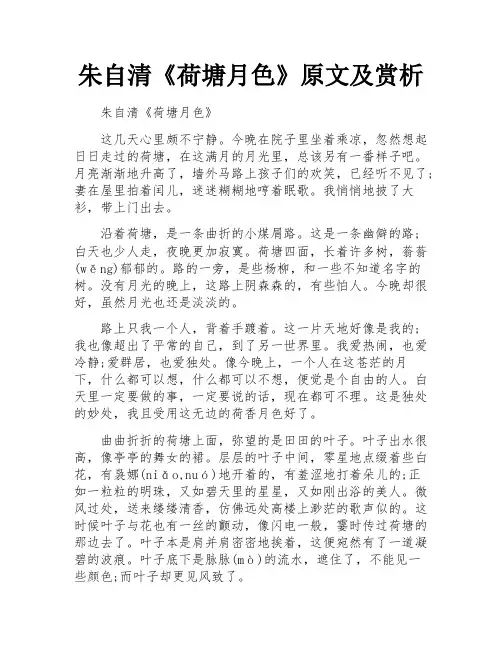
朱自清《荷塘月色》原文及赏析朱自清《荷塘月色》这几天心里颇不宁静。
今晚在院子里坐着乘凉,忽然想起日日走过的荷塘,在这满月的月光里,总该另有一番样子吧。
月亮渐渐地升高了,墙外马路上孩子们的欢笑,已经听不见了;妻在屋里拍着闰儿,迷迷糊糊地哼着眠歌。
我悄悄地披了大衫,带上门出去。
沿着荷塘,是一条曲折的小煤屑路。
这是一条幽僻的路;白天也少人走,夜晚更加寂寞。
荷塘四面,长着许多树,蓊蓊(wěng)郁郁的。
路的一旁,是些杨柳,和一些不知道名字的树。
没有月光的晚上,这路上阴森森的,有些怕人。
今晚却很好,虽然月光也还是淡淡的。
路上只我一个人,背着手踱着。
这一片天地好像是我的;我也像超出了平常的自己,到了另一世界里。
我爱热闹,也爱冷静;爱群居,也爱独处。
像今晚上,一个人在这苍茫的月下,什么都可以想,什么都可以不想,便觉是个自由的人。
白天里一定要做的事,一定要说的话,现在都可不理。
这是独处的妙处,我且受用这无边的荷香月色好了。
曲曲折折的荷塘上面,弥望的是田田的叶子。
叶子出水很高,像亭亭的舞女的裙。
层层的叶子中间,零星地点缀着些白花,有袅娜(niǎo,nuó)地开着的,有羞涩地打着朵儿的;正如一粒粒的明珠,又如碧天里的星星,又如刚出浴的美人。
微风过处,送来缕缕清香,仿佛远处高楼上渺茫的歌声似的。
这时候叶子与花也有一丝的颤动,像闪电一般,霎时传过荷塘的那边去了。
叶子本是肩并肩密密地挨着,这便宛然有了一道凝碧的波痕。
叶子底下是脉脉(mò)的流水,遮住了,不能见一些颜色;而叶子却更见风致了。
月光如流水一般,静静地泻在这一片叶子和花上。
薄薄的青雾浮起在荷塘里。
叶子和花仿佛在牛乳中洗过一样;又像笼着轻纱的梦。
虽然是满月,天上却有一层淡淡的云,所以不能朗照;但我以为这恰是到了好处——酣眠固不可少,小睡也别有风味的。
月光是隔了树照过来的,高处丛生的灌木,落下参差的斑驳的黑影,峭楞楞如鬼一般;弯弯的杨柳的稀疏的倩影,却又像是画在荷叶上。
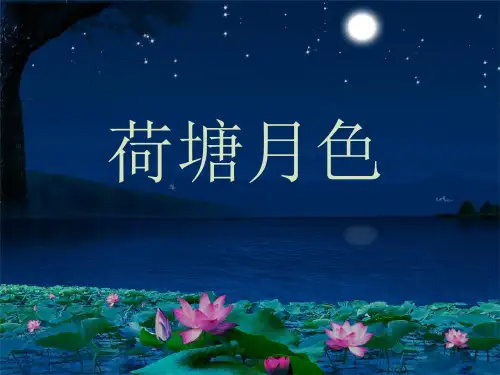
荷塘月色-朱自清-(中英文-译文)side of the path there are some willow trees and several varieties of trees whose names I do not know. On moonless nights this path is dark and forbidding, giving one an eerie feeling. But this evening it was quite nice, even though the rays of the moon were pale.路上只有我一个人,背着手踱着。
这一片天地好像是我的;我也像超出了平常的自己,到了另一个世界里。
我爱热闹,也爱冷静;爱群居,也爱独处。
像今晚上,一个人在着苍茫的月下,什么都可以想,什么都可以不想,便觉是个自由的人。
白天里一定要做的事,一定要说的话,现在都可不理。
这是独处的妙处;我且受用这无边的荷香月色好了。
I am on my own, strolling, hands behind my back. This bit of the universe seems in my possession now; and I myself seem to have been uplifted from my ordinary self into another world. I like a serene and peaceful life, as much as a busy and active one; I like being in solitude, as much as in company. As it is tonight, basking in a misty moonshine all by myself, I feel I am a free man, free to think of anything, or of nothing. All that one is obliged to do, or to say, in the daytime, can be very well cast aside now. That is the beauty of being alone. For the moment, just let me indulge in this profusion of moonlight and lotus fragrance.Finding myself alone on the path, I folded my hands behind me and strolled along. The stretch of land and sky that spread out before me seemed to belong to me, and I seemed to transcend my own existence and enter another world. I love noise, but I also love quiet; I love crowds, but I also love seclusion. On a night like tonight, all alone under this vast expanse of moonlight, I can think whatever I wish, or think of nothing I wish. I feel myself to be truly free man. The things I must do and the words I must say during the daytime I need not concern myself with now; this is an exquisite secluded spot, a place where I can enjoy the limitless fragrance of the lotuses and the light of the moon.曲曲折折的荷塘上,弥望的是田田的叶子。
朱自清《荷塘月色》原文与赏析朱自清《荷塘月色》原文与赏析朱自清先生的《荷塘月色》作为脍炙人口的散文名篇,历来颇受人称道,在高中语文教学中,也向来是重点讲解篇目。
以下是小编为大家分享的原文与赏析。
《荷塘月色》原文:这几天心里颇不宁静。
今晚在院子里坐着乘凉,忽然想起日日走过的荷塘,在这满月的光里,总该另有一番样子吧。
月亮渐渐地升高了,墙外马路上孩子们的欢笑,已经听不见了;妻在屋里拍着闰儿,迷迷糊糊地哼着眠歌。
我悄悄地披了大衫,带上门出去。
沿着荷塘,是一条曲折的小煤屑路。
这是一条幽僻的路;白天也少人走,夜晚更加寂寞。
荷塘四面,长着许多树,蓊蓊郁郁的。
路的一旁,是些杨柳,和一些不知道名字的树。
没有月光的晚上,这路上阴森森的,有些怕人。
今晚却很好,虽然月光也还是淡淡的。
路上只我一个人,背着手踱着。
这一片天地好像是我的;我也像超出了平常的自己,到了另一世界里。
我爱热闹,也爱冷静;爱群居,也爱独处。
像今晚上,一个人在这苍茫的月下,什么都可以想,什么都可以不想,便觉是个自由的人。
白天里一定要做的事,一定要说的话,现在都可不理。
这是独处的妙处,我且受用这无边的荷香月色好了。
曲曲折折的荷塘上面,弥(mi)望的是田田的叶子。
叶子出水很高,像亭亭的舞女的裙。
层层的叶子中间,零星地点缀着些白花,有袅娜地开着的,有羞涩地打着朵儿的;正如一粒粒的明珠,又如碧天里的星星,又如刚出浴的美人。
微风过处,送来缕缕清香,仿佛远处高楼上渺茫的歌声似的。
这时候叶子与花也有一丝的颤动,像闪电般,霎时传过荷塘的那边去了。
叶子本是肩并肩密密地挨着,这便宛然有了一道凝碧的波痕。
叶子底下是脉脉的流水,遮住了,不能见一些颜色;而叶子却更见风致了。
月光如流水一般,静静地泻在这一片叶子和花上。
薄薄的青雾浮起在荷塘里。
叶子和花仿佛在牛乳中洗过一样;又像笼着轻纱的梦。
虽然是满月,天上却有一层淡淡的云,所以不能朗照;但我以为这恰是到了好处——酣(han)眠固不可少,小睡也别有风味的。
朱自清《荷塘月色》原文赏析朱自清《荷塘月色》原文赏析誉满文苑的《荷塘月色》是朱自清散文的代表作之一,是语文教材中的传统篇目。
下面是我们为大家带来朱自清《荷塘月色》原文赏析,欢迎大家阅读。
朱自清《荷塘月色》原文这几天心里颇不宁静。
今晚在院子里坐着乘凉,忽然想起日日走过的荷塘,在这满月的光里,总该另有一番样子吧。
月亮渐渐地升高了,墙外马路上孩子们的欢笑,已经听不见了;妻在屋里拍着闰儿,迷迷糊糊地哼着眠歌。
我悄悄地披了大衫,带上门出去。
沿着荷塘,是一条曲折的小煤屑路。
这是一条幽僻的路;白天也少人走,夜晚更加寂寞。
荷塘四面,长着许多树,蓊蓊郁郁的。
路的一旁,是些杨柳,和一些不知道名字的树。
没有月光的晚上,这路上阴森森的,有些怕人。
今晚却很好,虽然月光也还是淡淡的。
路上只我一个人,背着手踱着。
这一片天地好像是我的;我也像超出了平常的自己,到了另一世界里。
我爱热闹,也爱冷静;爱群居,也爱独处。
像今晚上,一个人在这苍茫的月下,什么都可以想,什么都可以不想,便觉是个自由的人。
白天里一定要做的事,一定要说的话,现在都可不理。
这是独处的妙处,我且受用这无边的荷香月色好了。
曲曲折折的荷塘上面,弥望的是田田的叶子。
叶子出水很高,像亭亭的舞女的裙。
层层的叶子中间,零星地点缀着些白花,有袅娜地开着的,有羞涩地打着朵儿的;正如一粒粒的明珠,又如碧天里的星星,又如刚出浴的美人。
微风过处,送来缕缕清香,仿佛远处高楼上渺茫的歌声似的。
这时候叶子与花也有一丝的颤动,像闪电般,霎时传过荷塘的那边去了。
叶子本是肩并肩密密地挨着,这便宛然有了一道凝碧的波痕。
叶子底下是脉脉的流水,遮住了,不能见一些颜色;而叶子却更见风致了。
月光如流水一般,静静地泻在这一片叶子和花上。
薄薄的青雾浮起在荷塘里。
叶子和花仿佛在牛乳中洗过一样;又像笼着轻纱的梦。
虽然是满月,天上却有一层淡淡的云,所以不能朗照;但我以为这恰是到了好处——酣眠固不可少,小睡也别有风味的。
荷塘月色Moonlight over the Lotus Pond朱自清Zhu Ziqing这几天心里颇不宁静。
今晚在院子里坐着乘凉,忽然想起日日走过的荷塘,在这满月的月光里,总该另有一番样子吧。
月亮渐渐地升高了,墙外马路上孩子们的欢笑,已经听不见了;妻在屋里拍着闰儿,迷迷糊糊地哼着眠歌。
我悄悄地披了大衫,带上门出去。
It has been rather disquieting these days. Tonight, when I Was sitting in the y ard enjoying thecool, it occurred to me that the Lotus Pond, which I pass by e very day, must assume quite adifferent look in such moonlit night. A full moo n was rising high in the sky; the laughter ofchildren playing outside had died away; in the room, my wife was patting the son, Run-er,sleepily humming a c radle song. Shrugging on an overcoat, quietly, I made my way out, closingthe door behind me.沿着荷塘,是一条曲折的小煤屑路。
这是一条幽僻的路;白天也少人走,夜晚更加寂寞。
荷塘四面,长着许多树,蓊蓊郁郁的。
路的一旁,是些杨柳,和一些不知道名字的树。
没有月光的晚上,这路上阴森森的,有些怕人。
今晚却很好,虽然月光也还是淡淡的。
Alongside the Lotus Pond runs a small cinder footpath. It is peaceful and se cluded here, aplace not frequented by pedestrians even in the daytime; now at night, it looks more solitary,in a lush, shady ambience of trees all around the pond. On the side where the path is, thereare willows, interlaced with so me others whose names I do not know. The foliage, which, in amoonless nigh t, would loom somewhat frighteningly dark, looks very nice tonight, although themoonlight is not more than a thin, grayish veil.路上只我一个人,背着手踱着。
散文翻译:《荷塘月色》三种译文对比刘全福散文多以文字优美胜出,故而又称“美文”。
所以“美”者,可表现于诸多方面:粗观之,能见其简洁精炼,流利畅达,朴素自然,音韵和谐;细审之,又见其或粗犷雄浑,严肃含蓄,细腻秀美,活泼晓畅,或粗犷细腻兼备,雄浑秀美互见,严肃活泼共存,晓畅含蓄俱在。
总之,散文语言别有洞天,尽管有“小家碧玉”之名,但就风格而论,则远比繁缛铺张的小说多几分浓密和雕琢,而又比高贵典雅的诗歌多几分清淡和自然,一句话,散文美就美在俏丽,美又美在淡雅。
在汉语散文的王国里,假如你要领略细腻的秀美,就去品一品朱自清的《月朦胧,鸟朦胧,帘卷海棠红》吧:“纸右一园月,淡淡的青光遍纸上:月的纯净柔软与平和,如一张睡美人的脸。
花正盛开,红艳欲流;黄色的雄蕊历历的,闪闪的。
衬托在丛绿之间,格外觉着妖娆了。
”那片片花瓣上“欲流”的艳红,那娟美动人的海棠花蕊,足以撩人情思了。
假如你要体验朴实平淡的况味,就再去望一望朱自清笔下父亲的背影吧:“我再向外看时,他已抱了朱红的橘子望回走了。
过铁道时,他先将橘子散放在地上,自己慢慢爬下,再抱起橘子走。
到这边时,我赶紧去搀他。
他和我走到车上,将橘子一股脑儿放在我的皮大衣上。
……等他的背影混入来来往往的人里,再找不着了,我便进来坐下,我的眼泪又来了。
”这里见不到恣意铺陈,也见不到重墨渲染,有的只是含蓄的白描,蕴藉的真情,而读来却耐人咀嚼,韵味无穷。
假如你还想感动于节奏的魅力,则不妨诵一诵郁达夫笔端溢出的故都的秋韵:“在南方每年到了秋天,总要想起陶然亭的芦花,钓鱼台的柳影,西山的虫唱,玉泉的夜月,潭拓寺的钟声。
”这畅达贯通的语势,这回环往复的乐音,如串串珠玑,旋动着明丽轻快的韵律。
一般认为,散文最明显的特点是“散而不乱”:“形散”而“神不乱”。
由于“形散”,便造就了语言的多样性,因“神不乱”,才吸引读者于色彩纷呈的语言中随着作者的笔迹去追寻作者审美的轨迹。
至于散文翻译的要点,大概也就在于以多样化的语言之“形”来传达散居于语言之中的“神”了。
荷塘月色---译文对比(三种英译文)朱自清这几天心里颇不宁静。
今晚在院子里坐着乘凉,忽然想起日日走过的荷塘,在这满月的光里,总该另有一番样子吧。
月亮渐渐地升高了,墙外马路上孩子们的欢笑,已经听不见了;妻在屋里拍着闰儿,迷迷糊糊地哼着眠歌。
我悄悄地披了大衫,带上门出去。
沿着荷塘,是一条曲折的小煤屑路。
这是一条幽僻的路;白天也少人走,夜晚更加寂寞。
荷塘四面,长着许多树,蓊蓊郁郁的。
路的一旁,是些杨柳,和一些不知道名字的树。
没有月亮的晚上,这路上阴森森的,有些怕人。
今晚却很好。
虽然月光也还是淡淡的。
曲曲折折的荷塘上面,弥望的是田田的叶子。
叶子出水很高,像亭亭的舞女的裙。
层层的叶子中间,零星地点缀着些白花,有袅娜地开着的,有羞涩地打着朵儿的;正如一粒粒的明珠,又如碧天里的星星,又如刚出浴的美人。
微风过处,送来缕缕清香,仿佛远处高楼上渺茫的歌声似的。
这时候叶子与花也有一丝的颤动,像闪电般,霎时传过荷塘的那边去了。
叶子本是肩并肩密密地挨着,这便宛然有了一道凝碧的波痕。
叶子底下是脉脉的流水,遮住了,不能见一些颜色;而叶子却更见风致了。
月光如流水一般,静静地泻在这一片叶子和花上。
薄薄的青雾浮起在荷塘里。
叶子和花仿佛在牛乳中洗过一样;又像笼着轻纱的梦。
虽然是满月,天上却有一层淡淡的云,所以不能朗照;但我以为这恰是到了好处——酣眠固不可少,小睡也别有风味的。
月光是隔了树照过来的,高处丛生的灌木,落上参差的斑驳的黑影,峭楞楞如鬼一般;弯弯的杨柳的稀疏的倩影,像是画在荷叶上。
塘中的月色并不均匀;但光与影有着和谐的旋律,如梵婀玲上奏着的名曲。
荷塘的四面,远远近近,高高低低都是树,而杨柳最多。
这些树将一片荷塘重重围住;只在小路一旁,漏着几段空隙,像是特为月光留下的,树色一例是阴阴的,乍看像一团烟雾;但杨柳的丰姿,便在烟雾里也辨得出。
树梢上隐隐约约的是一带远山,只有些大意罢了。
树缝里也漏着一两点路灯光,没精打采的,是瞌睡人的眼。
这时候最热闹的,要数树上的蝉声与水里的蛙声,但热闹是他们的,我什么也没有。
忽然想起采莲的事情来了。
采莲是江南的旧俗,似乎很早就有,而六朝时为盛;从诗歌里可以约略知道。
于是又记起《西洲曲》里的句子:采莲南塘秋,莲花过人头;低头弄莲子,莲子青如水。
今晚若有采莲人,这儿的莲花也算得“过人头”了;只不见一些流水的影子,是不行的。
这令我到底惦着江南了。
——这样想着,猛一抬头,不觉已是自己的门前;轻轻地推门进去,什么声息也没有,妻已睡熟好久了。
朱纯深译文I have felt quite upset recently. Tonight, when I was sitting in the yard enjoying the cool, it occurred to me that the Lotus Pond, which I pass by everyday, must assume quite a different look in such moonlit night. A full moon was rising high in the sky; the laughter of children playing outside had died away; in the room, my wife was patting the son, Run-er, sleepily humming acradle song. Shrugging on an overcoat, quietly, I made my way out, closing the door behind me. Alongside the Lotus Pond runs a small cinder footpath. It is peaceful and secluded here, a place not frequented by pedestrians even in the daytime; now at night, it looks more solitary, in a lush, shady ambience of trees all around the pond. On the side where the path is, there are willows, interlaced with some others whose names I do not know. The foliage, which, in a moonless night, would loom somewhat frighteningly dark, looks very nice tonight, although the moonlight is not more than a thin, greyish veil.All over this winding stretch of water, what meets the eye is a silken field of leaves, reaching rather high above the surface, like the skirts of dancing girls in all their grace. Here and there, layers of leaves are dotted with white lotus blossoms, some in demure bloom, others in shy bud, like scattering pearls, or twinkling stars, or beauties just out of the bath. A breeze stirs, sending over breaths of fragrance, like faint singing drifting from a distant building. At this moment, a tiny thrill shoots through the leaves and flowers, like a streak of lightning, straight across the forest of lotuses. The leaves, which have been standing shoulder to shoulder, are caught trembling in an emerald heave of the pond. Underneath, the exquisite water is covered from view, and none can tell its colour; yet the leaves on top project themselves all the more attractively.The moon sheds her liquid light silently over the leaves and flowers, which, in the floating transparency of a bluish haze from the pond, look as if they had just been bathed in milk, or like a dream wrapped in a gauzy hood. Although it is a full moon, shining through a film of clouds, the light is not at its brightest; it is, however, just right for me - a profound sleep is indispensable, yet a snatched doze also has a savour of its own. The moon light is streaming down through the foliage, casting bushy shadows on the ground from high above, dark and checkered, like an army of ghosts; whereas the benign figures of the drooping willows, here and there, look like paintings on the lotus leaves. The moonlight is not spread evenly over the pond, but rather in a harmonious rhythm of light and shade, like a famous melody played on a violin.Around the pond, far and near, high and low, are trees. Most of them are willows. Only on the path side can two or three gaps be seen through the heavy fringe, as if specially reserved for the moon. The shadowy shapes of the leafage at first sight seem diffused into a mass of mist, against which, however, the charm of those willow trees is still discernible. Over the trees appear some distant mountains, but merely in sketchy silhouette. Through the branches are also a couple of lamps, as listless as sleepy eyes. The most lively creatures here, for the moment, must be the cicadas in the trees and the frogs in the pond. But the liveliness is theirs, I have nothing.Suddenly, something like lotus-gathering crosses my mind. It used to be celebrated as a folk festival in the South, probably dating very far back in history, most popular in the period of Six Dynasties. We can pick up some outlines of this activity in the poetry. Then I recall those lines in Ballad of Xizhou Island:Gathering the lotus, I am in the South Pond,The lilies in autumn reach over my head;Lowering my head I toy with the lotus seeds.Look, they are as fresh as the water underneath.If there were somebody gathering lotuses tonight, she could tell that the lilies here are high enough to reach over her head; but one would certainly miss the sight of the water. So my memories drift back to the South after all. Deep in my thoughts, I looked up, just to find myself at the door of my own house. Gently I pushed the door open and walked in. Not a sound inside, my wife had beenfast asleep for quite a while.王椒升译文Of late, I have been in a rather uneasy frame of mind. Sitting in my courtyard enjoying the cool evening, I suddenly thought of the lotus pond that I pass on my way day in and day out. Tonight, it must have a charm all its own, bathed in the light of the full moon. The moon was now rising slowly. Beyond the wall, the happy laughter of children on the road had died away. So putting on my coat quietly, I went out closing the door softly behind me.A path paved with coal-dust zigzags along the lotus pond, so secluded as to be little frequented in the daytime, to say nothing of its loneliness at night. Around the pond grows a profusion of luxuriant trees. On one side of the path are some willows and other plants whose names are unknown to me. On moonless nights, the place has a gloomy, somewhat forbidding appearance. But on this particular evening, it had a cheerful outlook, though the moon was pale.On the uneven surface of the pond, all one could see was a mass of leaves, all interlaced and shooting high above the water like the skirts of slim dancing girls. The leaves were dotted in between the layers with white flowers, some blooming gracefully; others, as if bashfully, still in bud. They were like bright pearls and stars in an azure sky. Their subtle fragrance was wafted by the passing breeze, in whiffs airy as he notes of a song coming faintly from some distant tower. There was a tremor on leaf and flower, which, with the suddenness of lightning, soon drifted to the far end of the pond. The leaves, jostling and overlapping, produced, as it were, a wave of deep green. Under the leaves, softly hidden from view, water was rippling even its colour was not discernible so that the leaves looked more enchanting.Moonlight was flowing quietly like a stream down to the leaves and flowers. A light mist overspread the lotus pond. Leaf and flower seemed washed in milk. Moolight was glowing from behind the trees, and the dense shrubs above cast down gloomy ghostlike shadows of varying lengths and shades of colour. But the beautiful sparse shadows of the arching willows were like a picture etched on the lotus leaves. Uneven as was the moonlight over the pond, there was a harmony between light and shade, rhythmic as a well-known melody played on the violin. Skirting the lotus pond, far and near, high and low, are trees among which willows predominate. They entirely envelop the pond, leaving only a few spaces on one side of the path, as if purposely for the moonbeams to penetrate. The trees were now all enshrouded in a heavy gloom, which at first sight looked like a pall of mist, but the lovely shape of the willows remained distinguishable in spite of it. Distant hills loomed above the tree-tops in dim outline. Here and there, a few rays from street-lamps filtered through the trees, listless as the eyes of one who is dozing. At this moment, most lively were the cicadas chirping in the trees and the frogs croaking under the water. But theirs was all the merry-making, in which I did not have the least share.Then all of a sudden, I was reminded of the custom of plucking lotus seeds prevalent in Jiangnan, handed down probably from a very remote period and becoming quite popular during the Six Dynasties, as may be seen roughly in songs and poems that survive. This in turn revived my memory of the following lines in the “West Islet Ditty”:In autumn I pluck lotus seeds in the South Pond,Tall are the lotus plants, taller than me.My head bent low, with lotus seeds I play,Green, green as water all the lotus seeds I see.If there were people plucking lotus seeds here tonight, they might indeed find lotus plants exceeding them in height; but the absence of the merest shadow of flowing water would spoil it. And that is what has set me thinking about Jiangnan.《中国文学》译文The last few days have found me very restless. This evening as I sat in the yard to enjoy the cool, it struck me how different the lotus pool I pass every day must look under a full moon. The moon was sailing higher and higher up the heavens, the sound of childish laughter had died away from the lane beyond our wall, and my wife was in the house patting Run’er and humming a lullaby to him. I quietly slipped on a long gown, and walked out leaving the door on the latch.A cinder-path winds along by the side of the pool. It is off the beaten track and few pass this way even by day, so at night it is still more quiet. Trees grow thick and bosky all around the pool, with willows and other trees I cannot name by the path. On nights when there is no moon the track is almost terrifyingly dark, but tonight it was quite clear, though the moonlight was pale.As far as eye could see, the pool with its winding margin was covered with trim leaves, which rose high out of the water like the flared skirts of dancing girls. And starring these tiers of leaves were white lotus flowers, alluringly open or bashfully in bud, like glimmering pearls, stars in an azure sky, or beauties fresh from the bath. The breeze carried past gusts of fragrance, like the strains of a song faintly heard from a far-off tower. And leaves and blossoms trembled slightly, while in a flash the scent was carried away. As the closely serried leaves bent, a tide of opaque emerald could be glimpsed. That was the softly running water beneath, hidden from sight, its colour invisible, though the leaves looked more graceful than ever.Moonlight cascaded like water over the lotus leaves and flowers, and a light blue mist floating up from the pool made them seem washed in milk or caught in a gauzy dream. Though the moon was full, a film of pale clouds in the sky would not allow its rays to shine through brightly; but I felt this was all to the good --- though refreshing sleep is indispensable, short naps have a charm all their own. As the moon shone from behind them, the dense trees on the hills threw checkered shadows, dark forms loomed like devils, and the sparse, graceful shadows of willows seemed painted on the lotus leaves. The moonlight on the pool was not uniform, but light and shadow made up a harmonious rhythm like a beautiful tune played on a violin.Far and near, high and low around the pool were trees, most of them willows. These trees had the pool entirely hemmed in, the only small clearings left being those by the path, apparently intended for the moon. All the trees were sombre as dense smoke, but among them you could make out the luxuriant willows, while faintly above the tree-tops loomed distant hills --- their general outline only. And between the trees appeared one or two street lamps, listless as the eyes of someone drowsy. The liveliest sounds at this hour were the cicadas chirruping on the trees and the frogs croaking in the pool; but this animation was theirs alone, I had no part in it.Then lotus-gathering flashed into my mind. This was an old custom south of the Yangtze, which apparently originated very early and was most popular in the period of the Six Kingdoms, as we see from the songs of the time. I remember some lines from the poem West Islet:When they gather lotus at Nantang in autumnThe lotus blooms are higher than their heads;They stoop to pick lotus seeds,Seeds as translucent as water.If any girls were here now to pick the lotus, the flowers would reach above their heads too --- ah, rippling shadows alone are not enough! I was feeling quite homesick for the south, when I suddenly looked up to discover I had reached my own door. Pushing it softly open and tiptoeing in, I found all quiet inside, and my wife fast asleep。